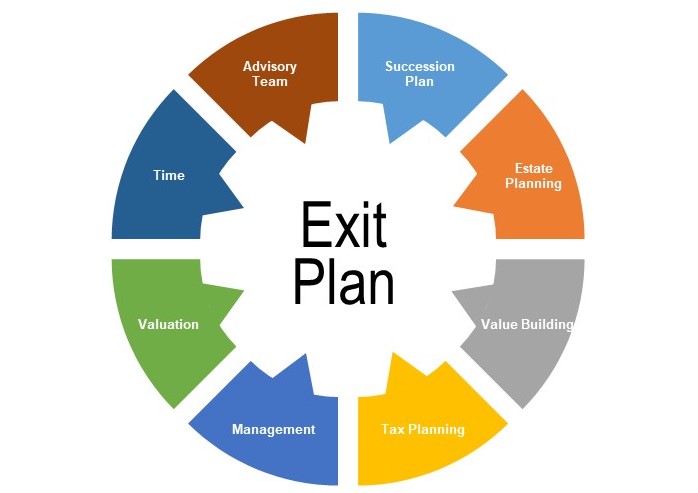How to Develop a Business Exit Strategy: Your Roadmap to Success

Imagine you're on a long, exhilarating journey. You've navigated challenging terrains, enjoyed stunning vistas, and gathered a lifetime of experiences. But now, you're ready to pass the map to someone else. This is what exiting your business feels like. But how do you ensure a smooth transition? Let's dive into the world of business exit strategies and help you plan your journey's end as meticulously as you planned its beginning.
Understanding Business Exit Strategies
A business exit strategy is a plan that allows you to leave your company, either by selling it, passing it on, or closing it. It's your transition strategy for moving on, and it's a critical aspect of exit planning.
Why You Need an Exit Strategy
You might be asking, "Why do I need an exit strategy now? I'm not planning to leave anytime soon." Fair question. But think of it this way: You don't wait until you're at the airport to plan your vacation. The same foresight should apply to your business.
An exit strategy helps you maximize your company's value, prepare for the unexpected, and ensure a smooth business succession. It's also a key consideration for investors. They want to know there's a plan in place for their return on investment.
Types of Business Exit Strategies
There are several ways to exit your business. Let's explore a few:
1. Selling Your Business
This is the most common exit strategy. It involves finding a buyer, negotiating a price, and transferring ownership. The key here is a thorough business valuation to ensure you get a fair price.
2. Mergers and Acquisitions (M&A)
In this scenario, your business is absorbed by or merged with another company. This can be a good option if you want your business to continue growing but don't want to be at the helm.
3. Passing on the Baton
This involves transferring your business to a family member or key employee. It's a great way to ensure your legacy continues, but it requires careful planning and preparation.
4. Liquidation
This is the process of closing your business and selling off its assets. It's usually a last resort, as it often results in the lowest return.
Developing Your Business Exit Strategy
Now that you understand the importance and types of exit strategies, let's dive into how to develop one.
1. Define Your Goals

What do you want to achieve with your exit? Are you looking to retire comfortably? Start a new venture? Ensure your business lives on? Your goals will shape your strategy.
2. Know Your Business's Worth
A comprehensive business valuation is crucial. This isn't just about your financial statements. It includes your brand value, customer base, intellectual property, and more. Tools like BizEquity can help.
3. Prepare Your Business
Think of this as staging your home before a sale. You want your business to look its best. This might involve streamlining operations, improving financials, or strengthening your management team.
4. Plan Your Timeline
Exiting your business isn't something that happens overnight. It can take years. So, plan your timeline carefully. When do you want to start winding down? When do you want to be fully out?
5. Consider Tax Implications
Selling or transferring your business can have significant tax implications. Consult with a tax professional to understand how to minimize your tax burden.
6. Find the Right Successor
Whether you're selling or passing on your business, you want to find the right person to take over. This could be a family member, employee, or outside buyer.
7. Document Everything
From your exit plan to your business operations, document everything. This makes the transition smoother and reduces the risk of misunderstandings.
Common Pitfalls to Avoid
Even with the best-laid plans, things can go awry. Here are some common pitfalls to avoid:
- Not Planning Early Enough: The earlier you start planning, the better.
- Overestimating Your Business's Value: Be realistic about what your business is worth.
- Not Considering All Options: Don't fixate on one exit strategy. Consider all options and choose the best fit.
- Not Seeking Professional Help: Exiting your business is complex. Don't be afraid to seek help from professionals like business brokers, lawyers, or accountants.
Conclusion: Your Exit is Just the Beginning
Developing a business exit strategy is more than just planning your departure. It's about securing your financial future, ensuring your business's legacy, and opening the door to new opportunities. So, start planning today. Your future self will thank you.
FAQs
When is the best time to start planning my exit strategy?
- The best time is now. Even if you don't plan to exit for years, having a strategy in place is always a good idea.
How do I know which exit strategy is right for me?
- This depends on your goals, your business, and your personal circumstances. Consider all options and consult with professionals to make an informed decision.
How long does it take to sell a business?
- The timeline can vary greatly, from a few months to a few years. It depends on factors like your business's size, industry, and the state of the economy.
How can I maximize my business's value before selling?
- You can do this by improving financials, streamlining operations, and strengthening your management team. A comprehensive business valuation can also help identify areas for improvement.
What if I can't find a suitable successor?
- If you can't find a suitable successor, you might consider other exit strategies, like a merger or liquidation. It's also a good idea to consult with a business broker or other professional for advice.

As you embark on this new journey, remember that every ending is also a beginning. Your business exit strategy is your roadmap to what comes next. So, plan wisely, seek advice, and most importantly, enjoy the journey. After all, it's not just about the destination, but the road that leads you there.
0 Response to "How to Develop a Business Exit Strategy: Your Roadmap to Success"
Post a Comment